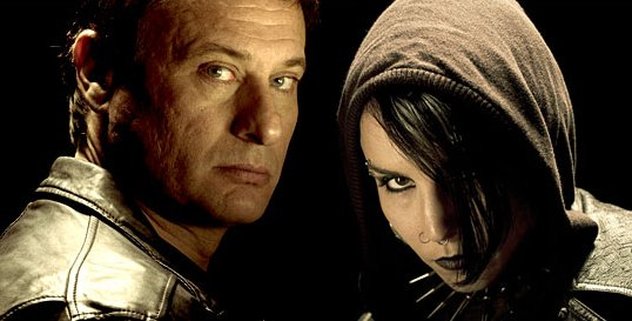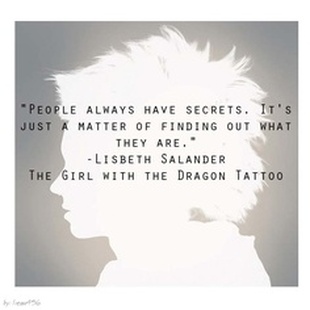“There is nothing to talk about" she said. "I'm just a freak that's all.” (345)
A psychoanalysis of the two protagonists.
Mikael Blomkvist and Lisbet Salander are the 2 protagonists of The Girl with the Dragon Tattoo. Both have very different, almost polarizing personalities, that attract the two in many different ways throughout the book.
To learn more about these personalities, one must go deeper into the minds of these two people, using psychoanalytic methods. Freudian psychology focuses on the subconscious, and Lacanian psychoanalysis focuses on language. Using these, one can delve into the depths of the mind.
To learn more about these personalities, one must go deeper into the minds of these two people, using psychoanalytic methods. Freudian psychology focuses on the subconscious, and Lacanian psychoanalysis focuses on language. Using these, one can delve into the depths of the mind.
Lisbeth Salander is a iconoclastic young lady who shies from the world, yet has a lot going on in her head at all times. Like a modern Sherlock Holmes, she is a detective with a knack for noticing patterns, and has a particular set of skills, such as hacking, investigating, and a photographic memory. She also has trouble dealing with "normal" people, mostly stemming from her history of untrustworthy people and abuse. She becomes a shut in, only dealing with people when necessary. As such, she is very withdrawn, using it as a coping mechanism to escape her past. Freud gives several different coping mechanisms that she uses, such as withdrawal, repression, displacement, and association. All of these appear somewhere in the book, and this social phobia remains strong throughout the entirety of the story.
However, she is not helpless. She has many different ways in getting what she wants, and is also good at getting revenge, such as what she does to her government appointed guardian after he rapes her. She can be deadly, both physically and in more underhanded ways. She acts as a freelance warrior against men who disrespect and hurt men, even going as far to say that they ought to be exterminated after dealing with Martin Vanger.
However, she is not helpless. She has many different ways in getting what she wants, and is also good at getting revenge, such as what she does to her government appointed guardian after he rapes her. She can be deadly, both physically and in more underhanded ways. She acts as a freelance warrior against men who disrespect and hurt men, even going as far to say that they ought to be exterminated after dealing with Martin Vanger.
Mikael Blomkvist is a journalist and fighter for the truth. Co-creator of the magazine Millennium, he goes out of his way to expose corruption and report the news righteously. This, however, is how he ends up in the Vanger case.
While he isn't a detective, he spends most of the book doing just that. He has a desire to solve mysteries and expose injustice, which works well for his line of work.
Blomkvist is a bit of a rarity in the book, as he is incredibly respectful to the women he encounters. The men in the Vanger family, Lisbeth's guardian and her boss all see women more as objects, some in extreme cases. Blomkvist, however, is a pretty nice guy when it comes to this sort of thing, which is what attracts Lisbeth to him in the end. While he does have relations with several different women, he rarely, if ever, initiates them. Some, like with Lisbeth, are more thrust upon him.
At the end of the book he makes the point that he values friendship more than sex, and makes this perfectly clear to Lisbeth. “Friendship—my definition—depends on two things. Respect and trust. Both elements have to be there. And it has to be mutual. You can have respect for someone, but if you don’t have trust, the friendship will crumble." (415). This is in stark contrast to Lisbeth, who can only respond with "I like having sex with you".
In the end, Blomkvist says he is corrupted because he cannot publish a lot of the story of the Vanger family, even though he solved the mystery of Harriet's disappearance. This shows that even at the end of the book he still values justice, although sometimes he cannot act on it.
While the two protagonists are quite different, they have very similar goals, and this opposition pulls them together in an intimate fashion, even causing Lisbeth to eventually fall in love with Blomkvist, much to her dismay.
While he isn't a detective, he spends most of the book doing just that. He has a desire to solve mysteries and expose injustice, which works well for his line of work.
Blomkvist is a bit of a rarity in the book, as he is incredibly respectful to the women he encounters. The men in the Vanger family, Lisbeth's guardian and her boss all see women more as objects, some in extreme cases. Blomkvist, however, is a pretty nice guy when it comes to this sort of thing, which is what attracts Lisbeth to him in the end. While he does have relations with several different women, he rarely, if ever, initiates them. Some, like with Lisbeth, are more thrust upon him.
At the end of the book he makes the point that he values friendship more than sex, and makes this perfectly clear to Lisbeth. “Friendship—my definition—depends on two things. Respect and trust. Both elements have to be there. And it has to be mutual. You can have respect for someone, but if you don’t have trust, the friendship will crumble." (415). This is in stark contrast to Lisbeth, who can only respond with "I like having sex with you".
In the end, Blomkvist says he is corrupted because he cannot publish a lot of the story of the Vanger family, even though he solved the mystery of Harriet's disappearance. This shows that even at the end of the book he still values justice, although sometimes he cannot act on it.
While the two protagonists are quite different, they have very similar goals, and this opposition pulls them together in an intimate fashion, even causing Lisbeth to eventually fall in love with Blomkvist, much to her dismay.


